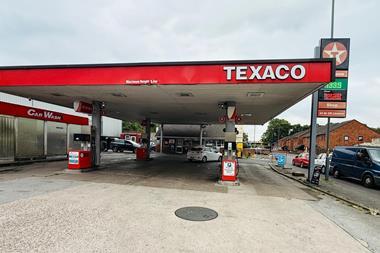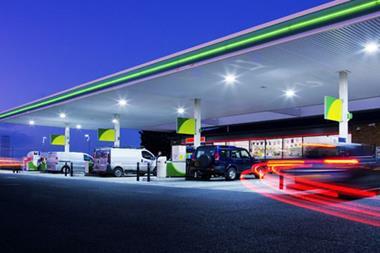In a high-volume, low-margin business such as fuel retailing, the accuracy of stock control can make a huge difference to profitability. If you can measure your stockholding with precision and then compare that figure with what should be in the tanks, taking into account the sales through the pumps, any discrepancy between the two figures will highlight an area for immediate investigation.
There are a number of possible explanations such as a leak from a tank or a pump that’s fractionally out. But no matter what’s responsible, a loss of even a small quantity of an expensive commodity like petrol or diesel will have a disproportionate affect on your bottom line. With the tight margins, you will have to sell a lot more to make up for any lost profit.
This is where the latest wet-stock management technology can make such a difference to a business. Gauges can monitor stock levels to a high degree of accuracy and software will carry out calculations many times a day, pinpointing issues in minutes rather than the days or weeks it could take manually.
With so much data available some companies also take a much closer hand in helping customers interpret the findings. Gareth Jenkins, communications manager at Fairbanks, explains: "Fairbanks uses the power of real-time data, which is constantly monitored by in excess of 100 analysts, to identify issues of concern. The analysts then manage any subsequent investigations to pinpoint the source and find the quickest possible solution, thus protecting the environment, reducing the potential for fuel-loss incidents and consequently lowering operational costs and improving margins for fuel retailers."
Changes in technology are also helping free up managers from their desks so they can access their systems on the go. Jenkins says: "Accurate information can be driven in real time straight to your fingertips, using our most recent innovation Station Manager 365. This intelligent software solution traverses all platforms enabling management teams to control operations remotely, with ease.
"Trends are changing across all walks of life with a growing number of people using tablets and mobiles rather than PCs the fuel industry is no different. Forecourt managers want to have instant access to their data without the need to be on site."
In addition to providing all the data to manage stock control, Fairbanks is aiming to extend its service into optimising the profitability of the fuel that is sold. Jenkins reveals: "Currently our developers are working on Margin Manager, which is due to be released later in the year. Pricing and margin management tools will help to simplify the process of calculating and tracking the selling price against the competition and review how the margin impacts on sales volumes.
"The way in which managers set their targets and monitor sales progress is changing. By using Margin Manager, attention can be focused on improving performance by reviewing historic sales against current trends and desired targets." Jenkins also emphasises that the benefits of the latest wet-stock management systems are not just for the bigger dealer groups. He says all Fairbanks’ services can be customised, regardless of customer size or complexity, and it offers a flexible, 24/7 service for independent retailers, hypermarket chains and multi-national companies alike. He adds: "Our wet-stock management system can be installed in a couple of hours without any disruption to your business. Fairbanks can protect your fuel stock from as little as £1 per day."
Future-proofed
Tokheim is Fairbanks’ parent company and has a range of equipment that complements Station Manager 365. ProGauge is Tokheim’s tank gauge system Station Manager 365 will work with other gauges and provides a versatile "future-proofed" solution, according to Tokheim UK sales director, Adrian Beeby.
An important feature of the system is its touch-screen Maglink console, which is designed so it can be upgraded remotely. Beeby explains: "There are no hard features on it no buttons so we can add new features very easily without having to change any hardware. The unit itself is ’future proof’ for as long as the technology that’s built into it can handle any new software we upload to it. If someone wants to update, it’s much cheaper with ProGauge than something that’s got mechanical hard buttons on it."
The probe is also designed for longevity. Its stainless steel construction means that as more additives such as ethanol are added into fuel they will have no effect, whereas some other probes made of aluminium are vulnerable to corrosion. It can also be used with the most corrosive products such as AdBlue and LPG.
Beeby adds: "Wired and wireless wifi probes are available so we don’t have to dig up a forecourt to get information back into the shop where wiring is not already installed. This can have a massive impact on the cost of installation."
The system also offers fuel quality sensors that will check density, viscosity and the dielectric of the fuel. Beeby says: "This will provide an alert in case the wrong grade of fuel is put into a tank or a delivery is off-spec to what was already in there."
In cases where dealers need to accurately determine the capacity of tanks for instance when they acquire a new site and no strapping is available 3D laser scanning is also available. Beeby explains: "If you don’t have a strapping table for a tank it will create one for you. This means the readings can be fed into the tank gauge and you don’t have to wait a period of time for the gauge to self calibrate."
Pedro Pacheco, Gilbarco Veeder-Root’s marketing director for wet-stock management, says its Insite360 is currently covering more than 30,000 sites worldwide, with a customer portfolio ranging from small dealers to large oil companies. It provides a range of services combined in different packages including a range of stock control functions, theft detection, monitoring fuel quality, tank calibration and support from Gilbarco Veeder-Root’s analysts.
Further enhancements
Shortly the company will rolling out further enhancements following its takeover in August last year, of a US wet-stock management software company called FuelQuest.
He says: "Their portfolio offers advanced solutions focusing on logistics and financial reconciliation, among others. Therefore, our main priority for the past 12 months has been to bring both wet-stock management platforms together. Soon this work will come to fruition when we roll out some of FuelQuest’s functionalities in Europe.
"In addition, we have focused on optimising and improving the performance of the already existing functionalities in parallel with the roll-out of a number of analytical tools. The purpose was to achieve greater analytical power and system capacity."
Pacheco says customers usually come to Gilbarco because they have a specific wet-stock problem that needs to be addressed. Beyond that, customer usage is split into two main groups:
Self-managed functions where the customer will use the Insite360 portal to check key information and infer improvement possibilities. Some packages also include forwarding selected alarms to chosen persons by email or SMS.
Advanced services, which includes support from Gilbarco analysts. Besides offering a broader range of services, the SAM (Service Account Manager) will work with the customer in optimising key wet-stock parameters starting with a definition of KPIs and targets.
He says that in one case Gilbarco worked with a dealer with more than 40 stations, and managed to save over £130,000 this year just by conducting meter-drift detection. He adds: "Usually, we manage to reduce wet-stock variances by a magnitude of 0.1% to 0.3%. For instance, this could represent an annual saving of 15,000 litres for a site with a throughput of 5mlpa."
Rather than taking a narrow view of wet-stock management, Phil Prow, sales and marketing director, Vianet Fuel Solutions, says that the company prefers to focus on forecourt management.
Vianet’s system has a range of modules with Clearview providing the classical wet-stock management functions, as well as modules covering compliance management and asset management and BigOil providing daily pricing information from Platts.
He says that the latest addition, order management solutions (OMS), can have a big impact on stock management and its effect on cash flow.
OMS is a centralised tool for dealers with multiple sites, which will flag up when to order fuel and recommend how much. Prow says it takes the decision away from site staff to someone who is going to drive it centrally.
He says it was introduced because an increasing number of customers were running out of fuel, while others had haul backs because they couldn’t fit the deliveries in the tank. So more and more sites are running out of fuel while others are carrying nine or 10 days stock.
He explains: "One customer with 25 sites was carrying just short of six days worth of stock, when you only really need three days. That’s half a million quid tied up and you could buy another petrol station just out of the cash-flow/working capital improvement. OMS improves cash flow because you are not running out."
In addition all the modules have been integrated so that rather than having to access them all separately, and them all looking and working differently, they are together and work in the same way.
Prow adds: "Because it’s much easier to use, customers are likely to get more benefits out of it."
protecting your site from theft
With their ability to monitor tanks in real time, wet-stock management systems can be used not only for leak detection, but also to protect against thieves attempting to steal a sites’ diesel stocks. Systems can be set up to detect rapid loss of stock outside of business hours and alert dealers to the problem.
Fairbanks communications manager Gareth Jenkins says: "Fairbanks sees fuel theft attempts most months and it certainly seems to be a growing problem with some retailers losing many thousands of litres at a time."
In one of the most recent incidents, fuel thieves who attempted to steal diesel from an MRH site in Essex were foiled after their activities were detected by Fairbanks’ remote fuel tank monitoring service (see graph above). In the early hours of May 27 thieves targeted the forecourt, intent on breaking into the tank farm and pumping out as much diesel as they could.
By 3.30am they had broken open the manhole cover for tank three, which they knew contained diesel. As the pumps started extracting the fuel, the stock depletion was detected by Fairbanks and the forecourt area manager was contacted.
The site manager was then alerted and he arrived on site to find the thieves making a hasty exit. The police were informed and all theft equipment was confiscated for investigation.
John Lynn, managing director of MRH, says: "The fuel theft detection service from Fairbanks gives MRH the peace of mind that, should anyone break into our tanks, there is a watchful pair of eyes keeping guard of our valuable stock.
"Since this incident we have increased the number of klaxon alarms from Fairbanks which act as a further deterrent to anyone on the forecourt."


























No comments yet